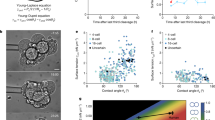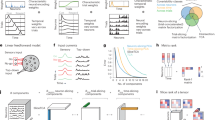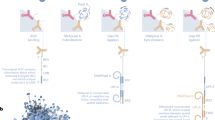Abstract
CONFLUENT chick embryo cells in culture grow much more slowly than do sparse cells in conditions where significant depletion of the medium is avoided1–3. Because an important factor regulating growth seems to be the population density, this phenomenon is called density dependent inhibition of growth4. When a thin scratch is made in a slowly growing confluent culture of chick embryo cells, the cells adjoining the scratch begin to grow rapidly and continue to do so until confluence is restored3. Growth of confluent cells can also be stimulated by the addition of a macromolecular component of serum5. We now report that the addition of proteolytic enzymes to the medium of inhibited cells in concentrations too low to cause cell detachment stimulates rapid growth among the cells.
This is a preview of subscription content, access via your institution
Access options
Subscribe to this journal
Receive 51 print issues and online access
$199.00 per year
only $3.90 per issue
Buy this article
- Purchase on Springer Link
- Instant access to full article PDF
Prices may be subject to local taxes which are calculated during checkout
Similar content being viewed by others
References
Rubin, H., and Colby, C., Proc. US Nat. Acad. Sci., 60, 482 (1968).
Colby, C., and Rubin, H., J. Nat. Cancer Inst., 43, 437 (1969).
Gurney, T., Proc. US Nat. Acad. Sci., 62, 906 (1969).
Stoker, M., and Rubin, H., Nature, 215, 171 (1967).
Todaro, G. J., Lazar, G. K., and Green, H., J. Cell. Comp. Physiol., 66, 325 (1965).
Rubin, H., Science, 167, 1271 (1970).
Northrup, J. H., J. Gen. Physiol., 9, 497 (1926).
Hakomori, S., Teather, C., and Andrews, H., Biochem. Biophys. Res. Commun., 33, 563 (1968).
Winzler, R. J., Harris, I. D., Pekas, D. J., Johnson, C. A., and Weber, P., Biochemistry, 6, 2195 (1967).
Burger, M. M., Nature, 219, 499 (1968).
Whitfield, J. F., Rixon, R. H., Perris, A. D., and Youdale, T., Exp. Cell Res., 57, 8 (1969).
Weis, L. S., and Narahara, H. T., J. Biol. Chem., 244, 3084 (1969).
Ershoff, B. H., and Bajwa, G. S., Proc. Soc. Exp. Biol. Med., 113, 879 (1963).
Jones, R. O., and Ashwood-Smith, M. J., Exp. Cell. Res., 59, 161 (1970).
Attardi, D. G., Schlesinger, M. J., and Schlesinger, S., Science, 156, 1253 (1967).
Greene, L. A., Shooter, E. M., and Varon, S., Proc. US Nat. Acad. Sci., 60, 1383 (1968).
Sylvén, B., and Malmgroen, H., Acta Radiol., Suppl., 154 (1957).
Author information
Authors and Affiliations
Rights and permissions
About this article
Cite this article
SEFTON, B., RUBIN, H. Release from Density Dependent Growth Inhibition by Proteolytic Enzymes. Nature 227, 843–845 (1970). https://doi.org/10.1038/227843a0
Received:
Issue Date:
DOI: https://doi.org/10.1038/227843a0
This article is cited by
-
Targeting proteinase-activated receptors: therapeutic potential and challenges
Nature Reviews Drug Discovery (2012)
-
Pronase modifies synaptic transmission and activity of identifiedLymnaea neurons
Invertebrate Neuroscience (1998)
-
Mitogens and hepatocyte growth control in vivo and in vitro
In Vitro Cellular & Developmental Biology (1990)
Comments
By submitting a comment you agree to abide by our Terms and Community Guidelines. If you find something abusive or that does not comply with our terms or guidelines please flag it as inappropriate.



